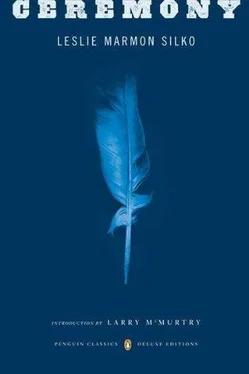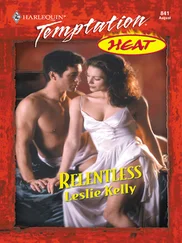The only cure
I know
is a good ceremony,
that’s what she said.
Sunrise.
Tayo didn’t sleep well that night. He tossed in the old iron bed, and the coiled springs kept squeaking even after he lay still again, calling up humid dreams of black night and loud voices rolling him over and over again like debris caught in a flood. Tonight the singing had come first, squeaking out of the iron bed, a man singing in Spanish, the melody of a familiar love song, two words again and again, “Y volveré.” Sometimes the Japanese voices came first, angry and loud, pushing the song far away, and then he could hear the shift in his dreaming, like a slight afternoon wind changing its direction, coming less and less from the south, moving into the west, and the voices would become Laguna voices, and he could hear Uncle Josiah calling to him, Josiah bringing him the fever medicine when he had been sick a long time ago. But before Josiah could come, the fever voices would drift and whirl and emerge again — Japanese soldiers shouting orders to him, suffocating damp voices that drifted out in the jungle steam, and he heard the women’s voices then; they faded in and out until he was frantic because he thought the Laguna words were his mother’s, but when he was about to make out the meaning of the words, the voice suddenly broke into a language he could not understand; and it was then that all the voices were drowned by the music — loud, loud music from a big juke box, its flashing red and blue lights pulling the darkness closer.
He lay there early in the morning and watched the high small window above the bed; dark gray gradually became lighter until it cast a white square on the opposite wall at dawn. He watched the room grow brighter then, as the square of light grew steadily warmer, more yellow with the climbing sun. He had not been able to sleep for a long time — for as long as all things had become tied together like colts in single file when he and Josiah had taken them to the mountain, with the halter rope of one colt tied to the tail of the colt ahead of it, and the lead colt’s rope tied to the wide horn on Josiah’s Mexican saddle. He could still see them now — the creamy sorrel, the bright red bay, and the gray roan — their slick summer coats reflecting the sunlight as it came up from behind the yellow mesas, shining on them, strung out behind Josiah’s horse like an old-time pack train. He could get no rest as long as the memories were tangled with the present, tangled up like colored threads from old Grandma’s wicker sewing basket when he was a child, and he had carried them outside to play and they had spilled out of his arms into the summer weeds and rolled away in all directions, and then he had hurried to pick them up before Auntie found him. He could feel it inside his skull — the tension of little threads being pulled and how it was with tangled things, things tied together, and as he tried to pull them apart and rewind them into their places, they snagged and tangled even more. So Tayo had to sweat through those nights when thoughts became entangled; he had to sweat to think of something that wasn’t unraveled or tied in knots to the past — something that existed by itself, standing alone like a deer. And if he could hold that image of the deer in his mind long enough, his stomach might shiver less and let him sleep for a while. It worked as long as the deer was alone, as long as he could keep it a gray buck on an unrecognized hill; but if he did not hold it tight, it would spin away from him and become the deer he and Rocky had hunted. That memory would unwind into the last day when they had sat together, oiling their rifles in the jungle of some nameless Pacific island. While they used up the last of the oil in Rocky’s pack, they talked about the deer that Rocky had hunted, and the corporal next to them shook his head, and kept saying he had dreamed the Japs would get them that day.
The humid air turned into sweat that had run down the corporal’s face while he repeated his dream to them. That was the first time Tayo had realized that the man’s skin was not much different from his own. The skin. He saw the skin of the corpses again and again, in ditches on either side of the long muddy road — skin that was stretched shiny and dark over bloated hands; even white men were darker after death. There was no difference when they were swollen and covered with flies. That had become the worst thing for Tayo: they looked too familiar even when they were alive. When the sergeant told them to kill all the Japanese soldiers lined up in front of the cave with their hands on their heads, Tayo could not pull the trigger. The fever made him shiver, and the sweat was stinging his eyes and he couldn’t see clearly; in that instant he saw Josiah standing there; the face was dark from the sun, and the eyes were squinting as though he were about to smile at Tayo. So Tayo stood there, stiff with nausea, while they fired at the soldiers, and he watched his uncle fall, and he knew it was Josiah; and even after Rocky started shaking him by the shoulders and telling him to stop crying, it was still Josiah lying there. They forced medicine into Tayo’s mouth, and Rocky pushed him toward the corpses and told him to look, look past the blood that was already dark like the jungle mud, with only flecks of bright red still shimmering in it. Rocky made him look at the corpse and said, “Tayo, this is a Jap ! This is a Jap uniform!” And then he rolled the body over with his boot and said, “Look, Tayo, look at the face,” and that was when Tayo started screaming because it wasn’t a Jap, it was Josiah, eyes shrinking back into the skull and all their shining black light glazed over by death.
The sergeant had called for a medic and somebody rolled up Tayo’s sleeve; they told him to sleep, and the next day they all acted as though nothing had happened. They called it battle fatigue, and they said hallucinations were common with malarial fever.
Rocky had reasoned it out with him; it was impossible for the dead man to be Josiah, because Josiah was an old Laguna man, thousands of miles from the Philippine jungles and Japanese armies. “He’s probably up on some mesa right now, chopping wood,” Rocky said. He smiled and shook Tayo’s shoulders. “Hey, I know you’re homesick. But, Tayo, we’re supposed to be here. This is what we’re supposed to do.”
Tayo nodded, slapped at the insects mechanically and staring straight ahead, past the smothering dampness of the green jungle leaves. He examined the facts and logic again and again, the way Rocky had explained it to him; the facts made what he had seen an impossibility. He felt the shivering then; it began at the tips of his fingers and pulsed into his arms. He shivered because all the facts, all the reasons made no difference any more; he could hear Rocky’s words, and he could follow the logic of what Rocky said, but he could not feel anything except a swelling in his belly, a great swollen grief that was pushing into his throat.
He had to keep busy; he had to keep moving so that the sinews connected behind his eyes did not slip loose and spin his eyes to the interior of his skull where the scenes waited for him. He got out of the bed quickly while he could still see the square of yellow sunshine on the wall opposite the bed, and he pulled on his jeans and the scuffed brown boots he had worn before the war, and the red plaid western shirt old Grandma gave him the day he had come home after the war.
The air outside was still cool; it smelled like night dampness, faintly of rain. He washed his face in the steel-cold water of the iron trough by the windmill. The yellow striped cat purred and wrapped herself around his legs while he combed his hair. She ran ahead of him to the goat pen and shoved her head under his left arm when he knelt down to milk the black goat. He poured milk for her in the lid of an old enamel coffeepot, and then he opened the pen and let them run, greedy for the tender green shoots of tumbleweeds pushing through the sand. The kid was almost too big to nurse any more, and it knelt by the doe and hunched down to reach the tits, butting her to make the milk come faster, wiggling its tail violently until the nanny jumped away and turned on the kid, butting it away from her. The process of weaning had gone on like this for weeks, but the nanny was more intent on weeds than the lesson, and when Tayo left them, the kid goat was back at the tits, a little more careful this time.
Читать дальше












